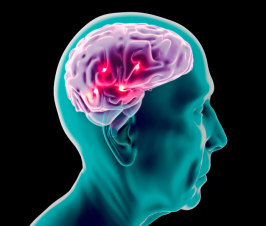There’s a common belief that musicians are born with a natural ability to play music, while most of us have to work twice as hard to hear the difference between musical notes. Now, new research from neuroscientists at York University suggests the capacity to hear the highs and lows, also known as the major and minor notes in music, may come before you take a single lesson; you may actually be born with it.
New research suggests the capacity to hear major and minor notes from as young as 6 months of age
The study, published in the Journal of the Acoustical Society of America, examined the capacity of six-month-old infants to discriminate between a major and a minor musical tone sequence with a unique method that uses eye movements and a visual stimulus.
Six-month-old infants show exactly the same breakdown as adults
Previous research with adults has shown that approximately 30 per cent of adults can discriminate this difference but 70 per cent cannot, irrespective of musical training. Researchers found that six-month-old infants show exactly the same breakdown as adults: approximately 30 per cent of them could discriminate the difference and 70 per cent could not.
“At six months, it’s highly unlikely that any of these infants have had any formal training in music,” says Scott Adler, associate professor, Department of Psychology in the Faculty of Health and member of Vision: Science to Applications (VISTA) Program at the Centre for Vision Research. “Yes, parents play music for children. All children in western civilization hear music, but they don’t get that specific training in music. This breakdown, therefore, is due to some inborn mechanism.”
Adler’s team at York collaborated on the study with Professor Charles Chubb, of the University of California at Irvine, whose earlier research with adults and adolescents found there are two populations of individuals: some who can discriminate between the major and minor tones and most who cannot discriminate. In adults, the capacity to discriminate between major and minor was shown not to be due to their level of musical training or their level of music exposure.
Could the source of this difference be genetic?
The new study extends the existence of those different populations down to infants, suggesting that the source of this difference might be genetic — a capacity that we are born with.
This capacity would have implications for developing appreciation of the emotional content of music, because it’s the major and minor notes that give music their emotion.
In the study, researchers conducted trials with 30 six-month-old infants in which they heard a tone-scramble, a series of notes whose quality (major vs. minor) signalled the location (right vs. left) where a subsequent picture (target) would appear. The babies were tasked with determining which side to look when they heard a major or a minor sound. Once they heard a series of notes, a picture would either appear on the right or the left depending on whether it was a major or minor tone scramble. In a second experiment, tone-scrambles did not reliably predict the location of subsequent pictures.
“What we measured over time was how the infants learned the association between which tone they heard and where the picture is going to show up. If they can tell the difference in the tone, over time, when they hear the major notes for example, they’ll make an eye movement to the location for the picture even before the picture appears because they can predict this. This is what we are measuring,” says Adler.
The findings
The researchers found that for 33 per cent or one-third of infants, these anticipatory eye movements predicted the picture location with near perfect accuracy; for the other 67 per cent, they were unrelated to the picture location.
These results may also have implications for language development, which relies on some of the same mechanisms and auditory content as music, says Adler.
A connection between music, music processing and mathematical abilities, as well as language, exists
“There is a connection between music, music processing and mathematical abilities, as well as language, so whether these things connect up to those abilities is unknown. However, when people talk to babies they change the intonation of their voice and the pitch of their voice so they’re changing from major to minor. That is actually an important component for babies to learn language. If you don’t have the capacity it might affect that ability in learning language.”
1. Scott A. Adler, Kyle J. Comishen, Audrey M. B. Wong-Kee-You, Charles Chubb. Sensitivity to major versus minor musical modes is bimodally distributed in young infants. The Journal of the Acoustical Society of America, 2020; 147 (6): 3758 DOI: 10.1121/10.0001349

Razi Berry is the founder and publisher of the journal Naturopathic Doctor News & Review, which has been in print since 2005, and the premier consumer-faced website of naturopathic medicine, NaturalPath. She is the host of The Love is Medicine Project docuseries, The Natural Cancer Prevention Summit, The Heart Revolution-Heal, Empower and Follow Your Heart, and the popular 10-week Sugar Free Summer program. From a near death experience as a young girl that healed her failing heart, to later overcoming infertility and chronic fatigue syndrome and fibromyalgia through naturopathic medicine, Razi has lived the mind/body healing paradigm. Her projects uniquely capture the tradition and philosophy of naturopathy: The healing power of nature, the vital life force in every living thing and the undeniable role that science and mind/body medicine have in creating health and overcoming dis-ease. You can follow Razi on social media: Facebook at Razi Berry, Instagram at Razi.Berry and join the Love is Medicine group to explore the convergence of love and health. Look for more, and listen to more Love is Medicine podcast episodes here.

















